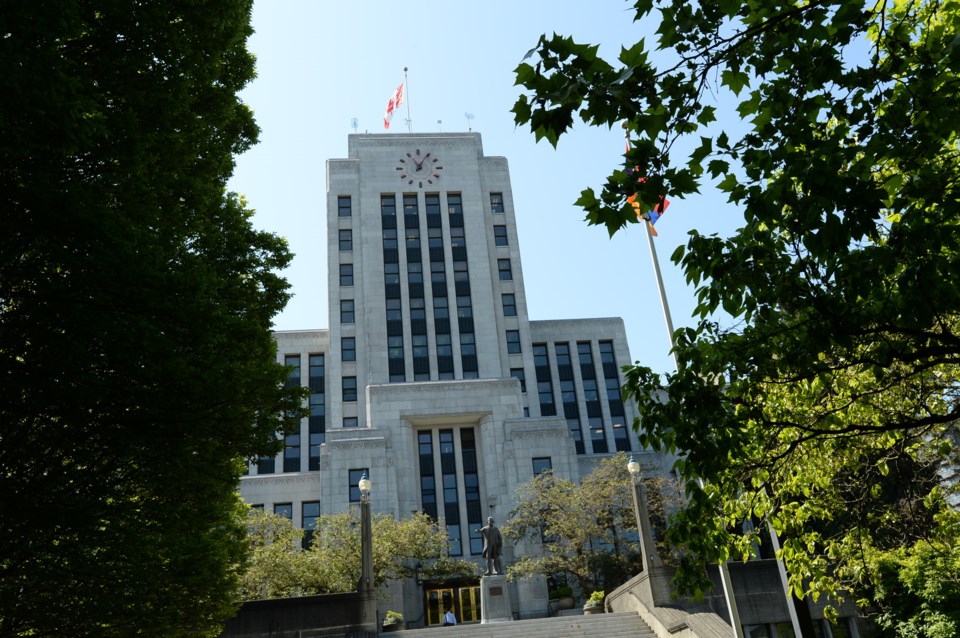The City of Vancouver will switch from an alphabetical to a randomized name order on the ballot for the 2018 civic election. Three councillors opposed the move — Green Party Coun. Adriane Carr and NPA councillors Melissa De Genova and Elizabeth Ball. The decision was reached at the June 6 city finances and services committee meeting. It will affect the order of candidates’ names for the mayoral, council and park board races.
Vision Vancouver Coun. Andrea Reimer was behind the idea. She argued candidates with names at the top of the ballot have an unfair advantage in elections. She first presented a motion to make the change at an April council meeting at which time council directed staff to further research the proposal and come up with a draft bylaw for council’s consideration.
Council has no control over the ballot name order for the Vancouver School Board. If it wants to go this route, trustees would have to pass a bylaw and direct the chief election officer to make the change from alphabetical.
The 2018 election budget will be increased by $235,000 to mitigate concerns about potential confusion among voters. The money will be spent on communicating the change to the public and paying for additional staff at voting stations.
During the debate, Carr echoed information outlined in the staff report that a randomized ballot could create confusion for some voters, including seniors.
She cited research indicating randomized ballots do lead to voter confusion, especially when there are many names on the list, unless there are other cues to differentiate the names such as party affiliation.
Carr also said research suggests name order mostly offers an advantage to the first name on the list, and she argued a randomized ballot is only truly randomized if there are multiple randomized ballots.
The Vancouver Charter, however, only gives two options — an alphabetized ballot or one in which the name order is determined by lot.
Carr put forward a referral motion to hold off on a decision until staff could analyze the possibility of making a change to the Vancouver Charter to allow for multiple randomized ballots, which she said might provide greater fairness.
“I do not believe we are ready to proceed with this,” she said.
Coun. Ball also said a randomized ballot is unfair to seniors and people with disabilities and the issue needed further examination before council proceeded.
Coun. De Genova asked that Carr’s referral motion include further consultation with advisory committees, including the Persons with Disabilities Advisory Committee. De Genova said people with disabilities such as dyslexia, which she deals with, might have difficulties with a change to the ballot.
She said Carr’s referral motion amounted to a pause, rather than a stop, calling it “very reasonable.”
But that motion was voted down in a 7-4 vote.
NPA Coun. George Affleck, who voted in favour of the main motion to switch to a randomized ballot, said the public’s perception is that there is a bias towards names at the top of the ballot.
People often tell him he benefitted since his name starts with A, which he finds frustrating.
“If we keep it as alphabetical, the argument will always be out there,” he said.
Affleck said after staff report back on the issue following the October municipal election, council can always revert back to an alphabetical ballot.
“I support this because I’m curious to see what happens and I think people in the city are asking for it,” he said.
Vision Vancouver Coun. Tim Stevenson agreed with that sentiment.
“It’s important that we try this out. It may be that it doesn’t work well. The next council after it can change it,” he said.
Vision Vancouver Coun. Raymond Louie pointed to recent city council elections in which many candidates with A, B, C and D names were elected — six out 10 in 2005, four out of 10 in 2008 and 2011, and five out of 10 in 2014.
“That seems disproportionate to me,” he said.
Reimer said the staff report “quite conclusively” speaks to the need to make ballots more fair due to evidence of a bias towards names at the top of a ballot.
Changes to the electoral system are often fought under the guise that it’s too confusing, she added, including the idea of a secret ballot.
“Yet now we would think of a non-secret ballot as barbaric, I’d say,” she said.
Reimer maintains the additional funding allocated to the election budget will address concerns about confusion.
@naoibh



